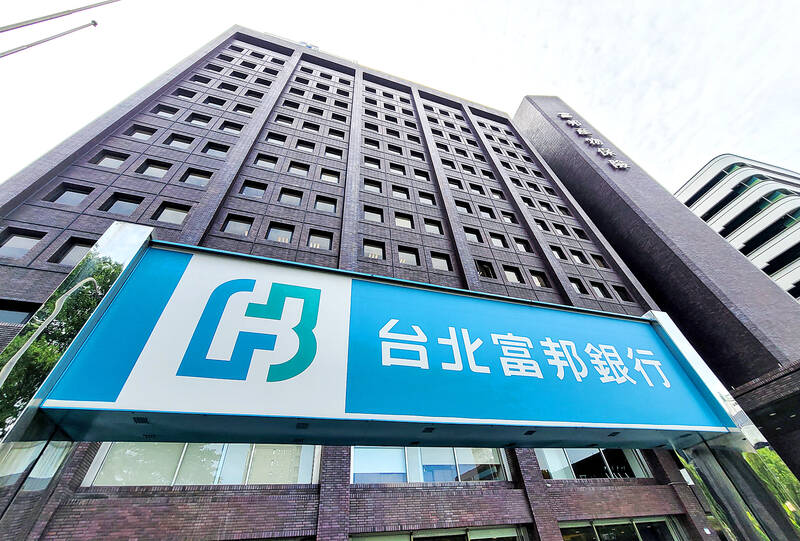Taiwan’s listed financial holding companies posted a combined net profit of NT$27.99 billion (US$871.3 million) last month, up 213.6 percent from a year earlier, driven by earnings contributed by their banking arms, companies’ regulatory filings showed.
Fubon Financial Holding Co (富邦金控) and Cathay Financial Holding Co (國泰金控) posted earnings of NT$5.4 billion and NT$4.77 billion respectively, making them the two most profitable financial conglomerates.
Their banking arms Taipei Fubon Bank (台北富邦銀行) and Cathay United Bank (國泰世華銀行) continued to benefit from earlier interest rate hikes at home and abroad, the companies said.

Photo: CNA
In addition, their life insurance subsidiaries, Fubon Life Insurance Co (富邦人壽) and Cathay Life Insurance Co (國泰人壽), received a boost in value for their US dollar-based assets at a time when global funds continued to flow to greenback-denominated investment tools that pay higher interest rates.
CTBC Financial Holding Co (中信金控) reported earnings of NT$4.46 billion last month, ranking third as the company benefited from improving lending, wealth management and credit card operations at its banking subsidiary CTBC Bank (中國信託銀行), the company said.
Its life insurance subsidiary Taiwan Life Insurance Co (台灣人壽) also made significant income contributions from selling assets, CTBC Financial said.
Among the 14 financial holding companies, only Taishin Financial Holding Co (台新金) was in the red last month as the company posted a net loss of NT$730 million due to lower investment gains at its subsidiary Taishin Venture Capital Investment Co (台新創投).
Overall, the 14 financial holding companies posted a combined net profit of NT$339.44 billion in the first nine months of the year, representing an 8.3 percent increase from a year earlier, as the sector emerged from COVID-19 pandemic insurance claims.
The figures might exceed the NT$400 billion mark this year in the absence of black swan events, analysts said.

SEMICONDUCTORS: The German laser and plasma generator company will expand its local services as its specialized offerings support Taiwan’s semiconductor industries Trumpf SE + Co KG, a global leader in supplying laser technology and plasma generators used in chip production, is expanding its investments in Taiwan in an effort to deeply integrate into the global semiconductor supply chain in the pursuit of growth. The company, headquartered in Ditzingen, Germany, has invested significantly in a newly inaugurated regional technical center for plasma generators in Taoyuan, its latest expansion in Taiwan after being engaged in various industries for more than 25 years. The center, the first of its kind Trumpf built outside Germany, aims to serve customers from Taiwan, Japan, Southeast Asia and South Korea,

Gasoline and diesel prices at domestic fuel stations are to fall NT$0.2 per liter this week, down for a second consecutive week, CPC Corp, Taiwan (台灣中油) and Formosa Petrochemical Corp (台塑石化) announced yesterday. Effective today, gasoline prices at CPC and Formosa stations are to drop to NT$26.4, NT$27.9 and NT$29.9 per liter for 92, 95 and 98-octane unleaded gasoline respectively, the companies said in separate statements. The price of premium diesel is to fall to NT$24.8 per liter at CPC stations and NT$24.6 at Formosa pumps, they said. The price adjustments came even as international crude oil prices rose last week, as traders

SIZE MATTERS: TSMC started phasing out 8-inch wafer production last year, while Samsung is more aggressively retiring 8-inch capacity, TrendForce said Chipmakers are expected to raise prices of 8-inch wafers by up to 20 percent this year on concern over supply constraints as major contract chipmakers Taiwan Semiconductor Manufacturing Co (TSMC, 台積電) and Samsung Electronics Co gradually retire less advanced wafer capacity, TrendForce Corp (集邦科技) said yesterday. It is the first significant across-the-board price hike since a global semiconductor correction in 2023, the Taipei-based market researcher said in a report. Global 8-inch wafer capacity slid 0.3 percent year-on-year last year, although 8-inch wafer prices still hovered at relatively stable levels throughout the year, TrendForce said. The downward trend is expected to continue this year,

POWERING UP: PSUs for AI servers made up about 50% of Delta’s total server PSU revenue during the first three quarters of last year, the company said Power supply and electronic components maker Delta Electronics Inc (台達電) reported record-high revenue of NT$161.61 billion (US$5.11 billion) for last quarter and said it remains positive about this quarter. Last quarter’s figure was up 7.6 percent from the previous quarter and 41.51 percent higher than a year earlier, and largely in line with Yuanta Securities Investment Consulting Co’s (元大投顧) forecast of NT$160 billion. Delta’s annual revenue last year rose 31.76 percent year-on-year to NT$554.89 billion, also a record high for the company. Its strong performance reflected continued demand for high-performance power solutions and advanced liquid-cooling products used in artificial intelligence (AI) data centers,